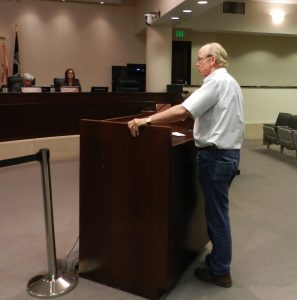
After almost fifty years face-to-face experience with the Seriously Mentally Ill (SMI), Lonny Davis estimates he’s encountered around 4,000 patients. Davis’s parents managed homes for SMI people, and when he took over the business he vowed to carry on their tradition of providing, “compassionate custodial care.”
Today, he manages seven guest homes, with number eight coming online soon. His headquarters is in Ceres. When the eighth home is up and running, Davis will supervise well over two-hundred SMI patients.
He prides himself on having the cleanest homes and best food of any comparable facility in Stanislaus County. He also has a full-time, on-call, 24/7 psychiatrist whose only mission is to care for residents of Davis Guest Homes.
Davis is especially proud of his costs of service—one-hundred and two taxpayer dollars a day. The dollar amount sounds like a lot until compared with the traditional locked facilities known as Institutions for Mental Diseases (IMD), where the cost per patient is two-hundred fifty to three-hundred dollars a day or more. Costs at traditional hospitals, where SMI patients are frequent visitors, run from two-thousand to thirty-five hundred dollars a day.
Davis says there are over sixty mentally ill Stanislaus County residents at IMD facilities outside the county, costing taxpayers at least two-hundred fifty dollars a day and often more. But after repeatedly approaching county supervisors and mental health officials with offers to save the county money by treating local SMI patients at Davis Guest Homes, Davis has had enough.
At Tuesday morning’s regularly scheduled meeting, Davis informed Stanislaus County Supervisors that Davis Guest Homes would no longer admit Stanislaus County residents. “We’re moving to an advocacy position regarding homelessness,” he said, “and we don’t want to confuse the issues.”
The day before, Davis had explained that he’d grown tired of accusations that his offers to help the county save money amounted to trolling for business.
“I always have a stack of applications,” said Davis. “I don’t need the county’s business. I have a sense of civic responsibility and I’ve tried to be a good citizen and help with a real problem and all I get is accusations I’m out for my own business.”
A strong supporter of Laura’s Law, Davis was disturbed when county supervisors paid $25,000 for a slipshod critique of the program. He was already familiar with the county’s unwillingness to provide help for SMI homeless people.
“Stanislaus County is known far and wide for its reluctance to conserve people,” Davis said before the supervisors’ meeting. “There’s plenty of legal basis to conserve people who are profoundly mentally ill, but it’s a subjective interpretation and Stanislaus County just doesn’t want to do it.”
Conservatorship in California occurs when a judge assigns a person or institution to care for a people who can’t care for themselves. Davis believes there are hundreds of such homeless people in Stanislaus County but county officials are reluctant to have them conserved.
“I’m not talking about borderline cases,” said Davis. “I’m talking about the shadow-boxers and the people screaming at imaginary enemies. I’m talking about people walking down the center lines of our streets. I’m talking about the people shouting curses and scaring children and their parents away from our public parks. How much more evidence do we need that they’re mentally ill?”
Davis said he had hopes he’d be able to have a good working relationship with the county’s new Director of Behavioral Health and Recovery Services, Richard DeGette. Shortly after DeGette was hired last September, Davis invited DeGette and other county officials to discuss homelessness and the mentally ill. But Davis was stunned when DeGette said the real solution was more jobs.
“I couldn’t believe what he was saying,” said Davis, “So I invited him to tour our home and meet our guests. After the tour I told him he could put any two guests he chose to work and I would pay their salaries. He just laughed and moved on.”

Davis said it’s a myth to think everyone who’s mentally ill can recover enough to work, and even those whose illness can be controlled with medication need supervision. Dr. Rex Adamson, the full-time psychiatrist for Davis Guest Homes, concurs:
“Even when medication controls their symptoms, SMI people need structure and supervision,” he said, “medication alone doesn’t always help.”
The contrast between Adamson’s credentials and DeGette’s offers a look at what amount to different theories about the causes and treatments for Serious Mental Illness. Adamson is a licensed psychiatrist who earned his degree in medicine at UC Davis.
Richard DeGette has a Master of Arts Degree in Agency Counseling from the University of Northern Colorado. He’s also a licensed Marriage and Family Therapist and earned a certificate for Mental Health Leadership from the University of Southern California. He has extensive experience in helping mentally ill people find work, but far less education in the medical field.
DeGette’s experience and training are based on the notion of recovery, and it’s true that some mentally ill people can recover and work. Some can, but many cannot. It’s the ones who cannot who concern Lonny Davis and Rex Adamson.
Both Lonny Davis and Rex Adamson believe mental illness has direct, observable, organic causes. They believe that heavy alcohol and drug use can also cause measurable brain damage that can be mitigated but not always cured. They believe that the appropriate response to Serious Mental Illness in such cases is what Davis calls, “a compassionate and competent environment.”
Davis has just about given up on discussing mental illness with people who think it’s a choice or lifestyle.
“Let’s get freakin’ serious here,” said Davis, “we keep getting subjective analysis of situations a third-grader could figure out. The bottom line is, mentally ill homeless people are lowering business and property values and we’ve got a compassionate and competent way to help them and get them off the streets.”
For Davis, and for a growing cadre of his fellow citizens, the real mystery is why local public officials are so reluctant to apply statistics and expert opinion to issues like homelessness and mental illness. It’s a good question.

Excellent article Eric. It cuts to the chase: If our community leaders who profess there are ‘No Others’ and that we have ‘Great Neighborhoods’ can’t provide, as Mr. Davis states, compassionate and competent environments for our seriously ill neighbors, then their words ring hollow and we must find new compassionate leaders.
Are you talking about the county conserving people or individual citizens? Course counties don’t want to do it. Too much money and hassle for them. But individual can go through a court process to conserve someone. I did with my mother. Still wasn’t able to find a place for her, though. No org or residency wants someone that isn’t stable or under treatment. That’s part of the larger failure here. Counties across the board fail to treat those with SMI. Laura’s law is a compromise of sorts btwn what we have now and more psyche hospitals/treatment centers.
Great article! Very difficult to conserve someone even when there is evidence they are ill. I called twice and was deterred away from even trying because of it’s difficult. It’s even difficult to get someone into a 72 hour hold; my sister while pregnant tried to commit homicide and suicide by walking down the middle of Tully Rd. She told the officer she wanted to kill herself and the baby because it was evil which did land her in the back of the police vehicle but within hours was walking the same street she was picked up on. Our county with the second highest with 51/50’s needs change. Lonnie keep speaking out and Eric thank you for writing the article.